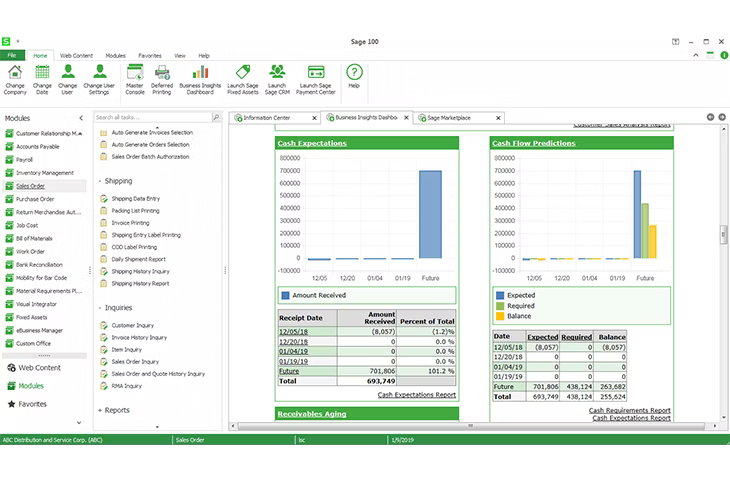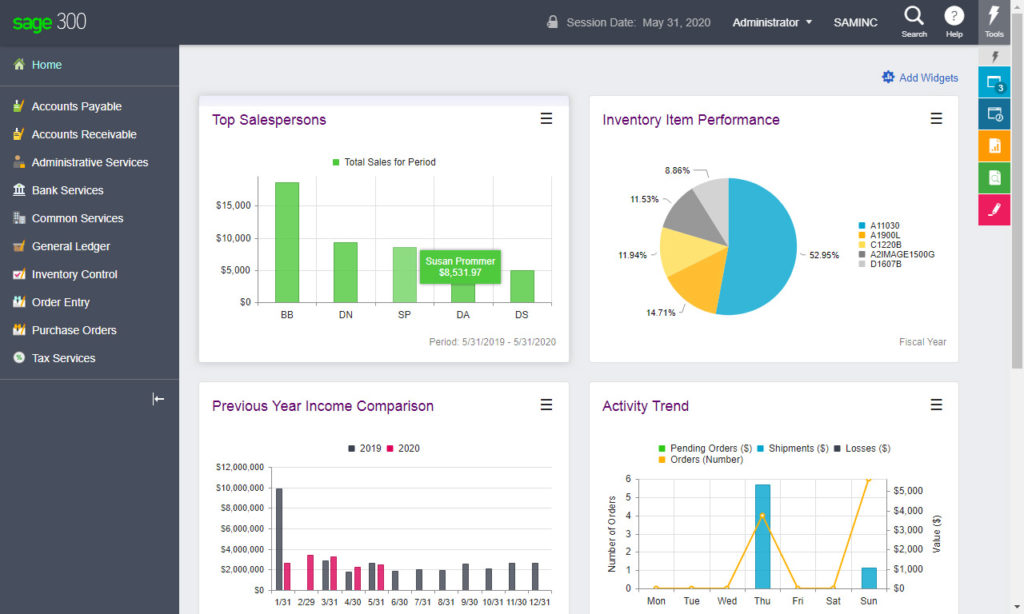What Are the Best QuickBooks Alternatives?
QuickBooks is a household name and rightly so. When Intuit first brought it to market in 1998, small businesses had to rely on manual methods, spreadsheets, or custom-built software to manage their books. Over the years, it has grown in popularity and is one of the most widely used bookkeeping tools for small businesses. It’s affordable and it gets the job done for a lot of organizations. That said, it has a lot of shortcomings from both a feature and accounting principles standpoint. As organizations grow and their needs evolve, they require software that goes beyond basic entry of debits and credits. They need tools that can keep pace with their growth and offer beneficial features that offer them the ability to do more with less, speed up tasks, and turn data into insights. Sooner or later, every company is going to start looking into QuickBooks alternatives.
Making the decision to graduate to a true accounting/ERP system before you start feeling major growing pains is the best-case scenario. But many companies fall into a trap where they continue to grow despite QuickBooks limitations through sheer hard work, determination, and workarounds. The irony is that this can paint you into a corner and, ultimately, make the jump both harder and more expensive. Thankfully, it’s never too late to improve and the investment will always be worth it.
<<Want to Know if Your Company is Outgrowing QuickBooks? Here are the Telltale Signs!>>
QuickBooks Alternatives
Acumatica
At a certain point, QuickBooks struggles with inventory management. Some companies will try “bolt-on” solutions like Fishbowl on top of QuickBooks, but it’s never enough. You want something that will grow and scale with your company’s successes. Acumatica is a cloud-based ERP solution known for its scalability and flexibility. You’ll find features that are similar to QuickBooks, such as invoicing and billing, financial management, project accounting, and customer management, but with the added benefit of more flexibility and room for growth.
Acumatica is far more suitable for Manufacturing, Distribution, and Retail businesses. Where QuickBooks falls flat with inventory, Acumatica shines. Construction companies will love the ability to generate AIA invoices, manage Certified Payroll, and do Fringe Benefit contributions automatically. Factor in their unique customer-friendly pricing model with unlimited user-licenses and modular set up where you pay for what features/resources you use, and you may find Acumatica is a strong contender in your search for QuickBooks alternatives.
Check out Acumatica if you need:
- Built-in CRM
- Excellent Mobile device availability
- Shop Floor Control (Manufacturing)
- Construction project accounting
- Warehouse Management (Barcoding)
Sage Intacct
Another longtime player in the ERP space, Sage offers multiple products to fit the needs of different types of businesses: Sage Intacct, Sage 100, and Sage 300. With Sage products, you’ll find a user-friendly interface and comprehensive features that cover everything from accounting to project management. Their products are also known for making it easy to get easily accessible insights into your financial data.
Sage Intacct is the only cloud ERP system endorsed by the American Institute for Certified Public Accountants (AICPA). Why does that matter? Where QuickBooks has weak internal controls and makes it easy to violate even the most basic accounting principles, Intacct is an auditors’ dream, providing airtight coverage and keeping your books in perfect order.
Check out Intacct if you find yourself:
- Wasting time logging in and out of multiple QuickBooks companies throughout the day
- Exporting those companies financial reports into excel and having to compile that data and spend massive amounts of time consolidating P&Ls and other reports.
- Growing frustrated with QuickBooks’ inability to match multiple invoices to one bank transaction or vice versa.
- Trying over and over to report on your data the way you want to see it. Breaking it down categorically involves pivot tables and headaches.
- Performing double data entry because there’s no integration with another tool you use.
<<Want to See How Acumatica and Sage Intacct Stack Up Against Each Other? Check out Our Free Comparison Guide!>>
Sage 100
Just because its Sage, does not mean it’s similar. Sage 100 and Intacct are not comparable to QuickBooks Desktop 2023 and 2024 (or even QuickBooks Desktop and QuickBooks Online). Sage 100 is an ERP system in the most traditional sense. It’s the grizzled veteran of the industry for the past 30 years. Its biggest strengths are around inventory management, its ability to be customized, and its features that support manufacturing and distribution.
Sage 100 primarily focuses on the wholesale distribution sector, with ongoing software improvements geared towards this niche. Despite this focus, the software offers various enhancements that cater to a range of industries. Currently, it boasts more than 20 distinct software modules, including ones tailored for light manufacturing and e-commerce. Key features include its scalability, bank reconciliation, deep customization options for your scripting, and automatic detection of unrecorded transactions and other financial hiccups. Though it’s most often used as an on-prem product, Sage 100 offers a cloud-based deployment option for users looking for a cloud based ERP ecosystem.

Wholesale and distributor companies will do well to invest in Sage 100, which has become a mainstay for those industries.
Check out Sage 100 if you’ve been struggling with:
- Work order processing
- Lack of a Bill of Materials
- Inventory tracking and forecasting
- Managing multiple warehouses
Sage 300
Mid-sized to larger businesses are in an interesting state; they always need to be prepared for rapid growth and expansion. And for your dollar, you’d be hard-pressed to find many tools better for medium-sized businesses than Sage 300. 300 offers companies with that operate in multiple countries and multiple currencies a strong solution tool to manage their organization as a whole.

Like Sage 100, Sage 300 also offers a cloud-based variant package for those interested.
Sage 300 allows companies to seize top-down control of their finances with everything you’d expect from an ERP contender: inventory tools, accounts payable/receivable, general ledger management, and automated purchase orders, among other standard features. But one exciting feature is 300’s unique “Pay Now” link on invoices; these links allow customers to accept invoice payments online with the new Sage 300 Payments Acceptance feature. Users can link their Sage instance with their business’ accounts to accept card payments online, smoothing out the entire payment process to a few moments.
Check out Sage 300 if your company has:
- Operations in multiple companies
- Transactions in multiple currencies.
- A large volume of transactions
- A complex organizational structure
Want to Discuss Options for QuickBooks Alternatives?
Feel free to read some of our additional ERP related content for more information on software that can act as a replacement or QuickBooks alternatives. Or, if you want to see how some of these alternatives compare head-to-head, check out our comparison guides that compare the likes of Sage, Acumatica, and more!
Prefer to jump right into things instead? Give us a ring and chat with one of our ERP experts today They’re all excellent recourses on all things ERP and finance management tools in general. They can help you get started on finding the perfect fintech product to help your business grow.
Author Bio
Frank Cuccio
Frank Cuccio joined BrainSell in 2021 as a Customer Success Manager and now serves as BrainSell's ERP Account Executive. He has a BBA in Accounting from Loyola University Maryland and an MBA from Rutgers University. Frank enjoys meeting new people and forming relationships.
View Posts
Related Post
Stay in the Loop!
Subscribe to get all our latest content sent directly to your inbox!





